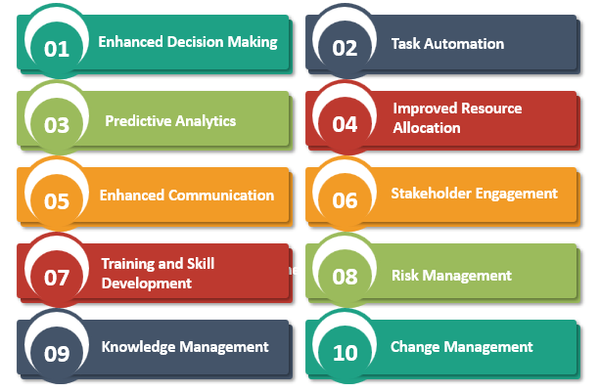What Is The Impact of AI on Project Management?
Artificial Intelligence (AI) has started to make significant inroads into the realm of project management, offering potential advancements and posing new challenges. Here's a look at the impact of AI on project management:

- Enhanced Decision Making: AI can analyze vast amounts of data rapidly, providing insights that help project managers make informed decisions. This can be particularly beneficial for risk assessment, resource allocation, and forecasting.
- Task Automation: Routine and administrative tasks, such as scheduling meetings, updating progress charts, or sending reminders, can be automated with AI, allowing project managers to focus on more strategic activities.
- Predictive Analytics: AI can predict potential delays, cost overruns, or resource shortages by analyzing historical project data and current project dynamics. This enables project managers to preemptively address issues before they become critical.
- Improved Resource Allocation: By analyzing team members' skills, past performance, and workload, AI can assist in optimally assigning tasks and resources, ensuring that the right people are working on the most suitable aspects of a project.
- Enhanced Communication: AI-driven chatbots and virtual assistants can facilitate better communication by providing instant responses to queries, scheduling updates, or even translating conversations in real-time for global teams.
- Stakeholder Engagement: AI can monitor stakeholder engagement levels by analyzing communication patterns and feedback, enabling project managers to address concerns proactively.
- Training and Skill Development: AI can identify skill gaps in a team by analyzing project outcomes and feedback. It can then recommend tailored training or skill development resources to address those gaps.
- Risk Management: AI can continuously monitor various project parameters and external factors to identify potential risks. It can then suggest mitigation strategies based on past data and predictive modelling.
- Knowledge Management: AI can sift through vast amounts of project documentation and data to retrieve relevant information, ensuring that project teams have access to the knowledge they need when they need it.
- Change Management: By analyzing historical data, AI can predict how changes in one area of a project might impact other areas, helping teams navigate and manage change more effectively.
Challenges and Considerations
- Over-reliance on AI: While AI can provide valuable insights, it's essential to balance these with human intuition and judgment. Solely depending on AI might lead to overlooking nuances or contextual factors.
- Data Privacy and Security: Implementing AI means handling large amounts of data, which raises concerns about data security, privacy, and potential misuse.
- Job Displacement Concerns: As AI automates various tasks, there are concerns about job displacements in roles that predominantly involve routine and administrative functions.
Conclusion
In conclusion, while AI presents promising opportunities for enhancing project management, it's vital to approach its integration thoughtfully, ensuring that technology complements human expertise rather than entirely replacing it.



